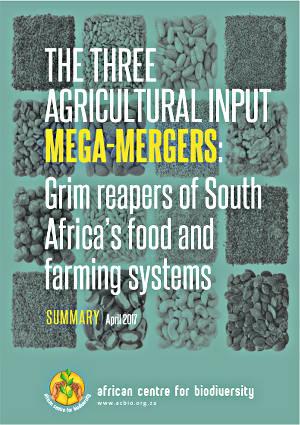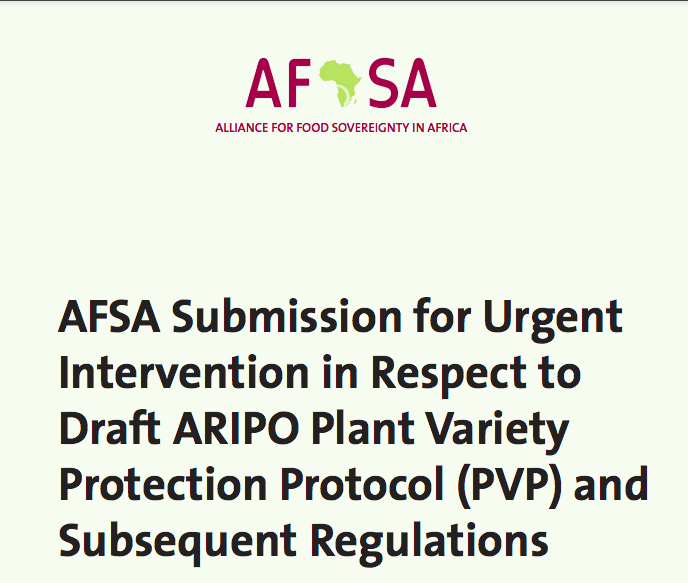Latest Resources

11 April 2017
Mega-mergers: 3 giant corporations controlling South Africa’s food and farming systems
This briefing deals with the three mega mergers taking place in the agriculture sector as Dow Chemical and DuPont are set to merge, China National Chemical Corporation (ChemChina) is to acquire Syngenta and Bayer is to acquire Monsanto. The proposed Bayer-Monsanto merger will give control of almost 30% of the world’s commercial seed market and […]

28 November 2016
Biosafety aspects of genome-editing techniques
Biosafety TWN Briefing – Biosafety aspects of genome-editing techniques. You can download the paper here.

28 July 2016
ACB Preliminary comments on Draft Regulations Implementing the Arusha Protocol for the Protection...
Draft Regulations for the implementation of the African Regional Intellectual Property Organisation’s (ARIPO’s) Arusha Protocol for the Protection of New Plant Varieties (Arusha Protocol), were considered for adoption in June 2016. The proposed regulations included provisions designed to intimidate and force seed processors, seed suppliers, government certification officers and even farmers’ organisations to police and […]

30 August 2015
AFAP in Ghana, Mozambique and Tanzania—for profits or people?
The chemical fertiliser push in Africa and its implications for smallholder farmers is not receiving enough attention in current discourses concerning Green Revolution policies and practises in Africa. Yet chemical fertilisers are big business on the continent, where its adoption is strongly supported by African governments through subsidy schemes and regional organisations such as NEPAD, […]

11 June 2014
AFSA Makes Small Gains for Farmers’ Rights in Draft SADC PVP Protocol
AFSA members participated at a SADC Regional Workshop that took place 13-14 March 2014, in Johannesburg, South Africa. The aim of the workshop was to review the draft SADC PVP Protocol. After marathon, highly contentious and difficult discussions, AFSA members were able to persuade member states to amend key provisions in the draft SADC PVP […]

9 March 2011
How US sorghum seed distributions undermine the FAO Plant Treaty’s Multilateral System
New data from ICRISAT and the US Department of Agriculture and a comparison of genebank records indicates that half of more of ICRISAT’s sorghum genebank collection is also being distributed outside of the Multilateral System. This yawning gap creates an economic incentive for the Multilateral System and its benefit-sharing requirements to be avoided. USDA’s sorghum […]

16 February 2011
African Millet Under Threat
The African Centre for Biosafety (ACB) has focused several recent reports on new international commercial interest and patent claims on the African native crop sorghum. This includes the issues raised by the proposed widespread use of sorghum for the production of agrofuels. This report extends ACB’s examination of new international commercial interest in African native […]

4 February 2011
Sorghum and the Antioxidant Craze: What Benefit for Africa’s Farmers?
A highly successful health food company in the United States, Silver Plate Inc, is seeking to cash in on the health benefits of sorghum. More particularly, it has begun to commercialize foods rich in sorghum anthocyanins, natural “antioxidant” chemicals found in some strongly coloured plant foods that are believed to have heart and other health […]

31 January 2011
Water Efficient Maize for Africa: Pushing GM Crops onto Africa
This paper looks at the Water Efficient Maize for Africa (WEMA) project within the context of the race by massive agribusiness corporations to bring climate change related crops to the market. The first part of the paper explains the WEMA project within this context, outlining the players and the stakes involved. It looks at who […]

28 October 2010
Synthetic Biology in Africa: Recent Developments
By Gareth Jones and Mariam Mayet The focus of this paper is the emerging field of synthetic biology, in particular its implications for the African continent. Synthetic biology combines a number of scientific disciplines and is generally understood to involve the deliberate design of biological systems, using standardised components that have been created in a […]
